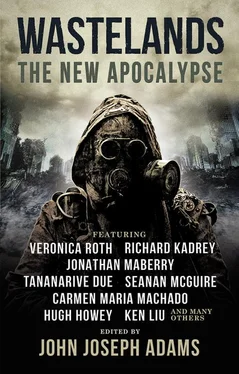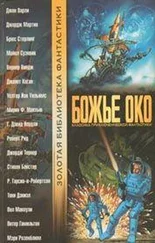She noted his displeasure and said, “You’re surprised. You must have been gone for a while. Orgynism?”
“Yes.”
“I was in one, about eight hundred years ago. It was a big one, with over a thousand participants, at its peak. It was bliss until one near the center went insane and started chewing his way out. I’m still missing some toes. How long have you been out?”
He told her.
“That explains your reaction to the food. You’re new to the way things have been falling apart.”
“I notice you’re not eating either.”
“I never do. I have no stomach. No internal organs of any kind. This,” she said, drumming her silvery digits on the table, “is what I’m made of now. I suppose I’ll last longer this way, when the city’s gone.”
“So it’s not a rumor.”
“No.”
He pointed at her food. “You ordered.”
“I wanted to sit. The table provided. But I outgrew food long ago. You should, too. The city won’t be making much more of it.”
He remembered the predictions of the shit-thing. “How much time do you think we still have? Months? Years? Centuries?”
“Who cares? It’s not like this place is fun anymore. We’ve seen everything. We’ve done everything. I’m only alive out of inertia.”
He said, “Up for suicide? I’ll join you, if that’s what you want.”
“I’ve done that,” Peat replied. “It didn’t take.”
“Then let’s get married.”
“I’ve done that a couple of dozen times, too. Once with you, in fact, though we weren’t the only people involved. But if you’d like to be in love for a while, just to pass the time, I’m willing to do that.”
“All right,” said Kayn.
Their courtship over, they both left the table, to make the necessary arrangements.
* * *
They didn’t know each other and didn’t like each other much, but that was no longer an inconvenience, not when they were both available and there were still working machines dispensing love. It was just a matter of recalibrating their internal referents and setting what intensity they wanted, from mild affection to all-out raging, clothes-shredding passion. The first through fourth of the stations they investigated were all derelict, three merely devoid of power and one incapable of producing anything but flatulent noises, but the fifth they found, in a vacant bazaar on the seventh level of the abandoned Third Church of Gilgul the Materialist, was still capable of producing Love at some settings, albeit none of the better ones. As per his lifelong habit as a man more comfortable with receiving that emotion than feeling it, he took a dose two notches lower than hers, and felt a surge of deep affection while she elected to feel something more, something rich and genuine and pure.
There was no chance of a standard honeymoon night, not that he wanted one, after the sexual surfeit of his recent centuries. He may have still possessed the parts, but she did not. But companionship, she provided. They shared a bed and sometimes a vat, and during the days they wandered the city, noting all the places that still existed and those that were still a ghost of what they had used to be.
They went to the Cinema, the last Cinema, a place that had been established millennia before, where mechanisms behind the screen projected a perpetual story compelling enough to be joined or abandoned at any point, without any sense that one had missed something. Alas, something primal had been lost over the years. In Kayn’s youth, the story had been an intricate saga of intrigue in the court of some medieval kingdom, driven by subtle turns of character and shifts of power dynamics among a cast of thousands. It had once kept him in his seat, being fed and tended by bots, for more than a month before the sameness overwhelmed him and he’d wandered out of the auditorium looking for a place to set some bombs. Years later, he’d returned, and the story had contracted to two men, armed with knives, grappling with one another in the center of a field of corpses. He’d spent a day watching them cut little strips of flesh off one another’s bodies, discerned no story, and left. Now, returning with Peat to an auditorium ankle-deep in sand occupied by a half-dozen dusty patrons he recognized from his earlier visits and who he presumed to have been watching the entire saga from the beginning, he found that the story had contracted still further: It was now a man forever punching a solid wall with the wrist-nubs that were all that remained of his arms, after his fists had eroded from an unimaginable number of constant impacts. “The machines are stuck,” Peat explained. “They used to be able to introduce new characters, establish new plot developments, create brand-new complications capable of carrying the narrative to new places, but in recent years they’ve been deteriorating. The narrative’s become fossilized. You can sit for years waiting for something different to happen.”
“It’s a great unintentional metaphor,” said Kayn.
The two of them stayed six hours, just watching the unfortunate on screen pummel the wall, waiting for something else to happen, anything else to happen. Nothing did, and they ultimately left in search of new adventures.
They found an abandoned building where Peat said that she’d lived once, a tower now leaning seventeen degrees which once would have been righted or had its architectural deficiency incorporated as a fresh source of novelty, and scaled the exterior to the summit, one hundred and forty stories above the avenue below. The apartment they found there was infested with spiders, and criss-crossed with vast curtains of webbing. The tenants, three women and one man, were cocooned and in the process of being digested, but did not seem to mind. One explained to Kayn that the spiders made such wonderful music. Kayn could detect nothing. Peat said that she could: “It’s just above your range of hearing, Kayn.”
He asked her what kind of music they were playing, and she said: “Waltzes. I can hum along, if you’d like to dance.” So they danced, the tightly wrapped residents of the apartment watching with delight and fascination as Kayn and Peat spun their circles across the tilted floor. How long they danced, Kayn could not tell, but it was long enough for the spiders to begin the process of capturing them, swathing Kayn in what looked like bandages and Peat in what looked like a diaphanous gown. And for a while he thought that it would not be a bad thing for his years of existence to end this way, so high above the city streets, as close to the dimming stars as he had ever been. But the spiders began to work in earnest, his skin began to itch, and he was moved to tell Peat that maybe they ought to go. They climbed back down, without him hearing so much as a single note.
Back on the streets, they found a corpse willing to speak to them. Terrible things had been done to him by a passing murderer of unremitting savagery, perhaps the same one whose handiwork Kayn had already seen here and there: It honestly didn’t matter, not to the victim and not to Kayn, because the deed had been done and the corpse was not willing to do anything constructive to fix it. His chest was still open to the elements, but he had elected not to heal or to die, but rather to continue to lie where the monster had left him, choosing to spend what time the city had left on his back, in contemplation of the few remaining stars. He said, “I remember being part of a great love story. I do not remember whether it was two men or two women or one woman and one man or a pair of thirders or any of the hundreds of other possible combinations we came up with, by the time it all started falling apart, but I remember being one of them. I remember telling the one I loved that I would never forget. I remember the finger against my lips, the whispered words, sure you will; everything we have done is just footnote. That turned out to be true. It was the one great love of my life and it happened so long ago that I cannot remember who my lover was, or for that matter who I was. I just remember regretting that I went on after it ended.” He took a deep breath that caused the cavity at the center of his chest to bubble, and then spoke with special urgency: “The city’s going to fall.”
Читать дальше


![Nick Cracknell - The Quiet Apocalypse [= Island Zero]](/books/28041/nick-cracknell-the-quiet-apocalypse-island-zero-thumb.webp)









